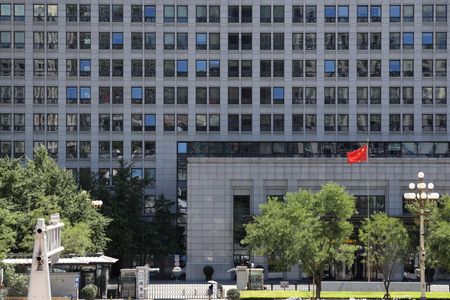By Ryan Woo
BEIJING (Reuters) -China’s Ministry of Commerce initiated an anti-discrimination investigation into U.S. trade policy over chips on Saturday, as well as a separate investigation into dumping, a day ahead of a new round of U.S.-China trade talks in Spain.
The first investigation would examine whether Washington had discriminated against Chinese companies in its policies on trade in chips. The second would look into suspected dumping of imports of some U.S. analog chips used in devices such as hearing aids, Wi-Fi routers and temperature sensors.
The ministry said in a statement that the United States had imposed a series of restrictions on China over chips in recent years, including trade discrimination investigations and export controls.
Such “protectionist” practices are suspected of discriminating against China and are intended to curb and suppress China’s development of high-tech industries such as advanced computing chips and artificial intelligence, it added.
TALKS TO START IN MADRID
A delegation to be led by Chinese Vice Premier He Lifeng is due to kick off a new round of dialogue with the United States from September 14-17 in Madrid.
The commerce ministry has said the two sides will discuss economic and trade issues such as U.S. tariffs, the “abuse” of export controls and TikTok. In a separate statement on the talks on Saturday it questioned Washington’s policies.
“What is the U.S.’s intention in imposing sanctions on Chinese companies at this time?” the ministry said.
“China urges the U.S. to immediately correct its erroneous practices and cease its unwarranted suppression of Chinese companies. China will take necessary measures to resolutely safeguard the legitimate rights and interests of Chinese companies.”
On Friday, the United States added 32 entities, 23 of them in China, to a commerce department restricted trade list. They included two Chinese firms accused of acquiring U.S. chipmaking equipment for China’s top chipmaker SMIC.
The upcoming U.S-China talks in Spain will be the fourth major in-person meeting this year as the two countries seek to maintain a trade truce that reduced retaliatory tariffs on both sides and restored the flow of Chinese rare earth minerals to the United States.
After meetings in Geneva and London, the two sides largely agreed in late July in Stockholm to extend a tariff pause for another 90 days. President Donald Trump approved the extension on August 12 until November 10.
ByteDance’s short video app TikTok, which faces a potential ban in the U.S. unless it moves to U.S. ownership, will be on the agenda in the talks in Spain.
Trump has extended a deadline for TikTok to divest its U.S. assets until September 17. U.S. lawmakers have said TikTok’s U.S. user data could fall into the hands of China’s government.
“The Chinese government attaches great importance to data privacy and security and has never and will never require companies or individuals to collect or provide data located in foreign countries for the Chinese government in violation of local laws,” China’s official People’s Daily said in an article on Saturday.
If the United States insists on undermining the legitimate interests of Chinese companies, China will take necessary measures to safeguard national interests and the rights of Chinese companies, the Chinese newspaper wrote.
(Reporting by Ryan Woo; Editing by Sharon Singleton and Peter Graff)










